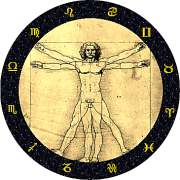Weboteric - Astrology
|
 |

Astrology - Pluto
Dark Master of the Underworld
“Hades is not to be soothed, neither overcome, wherefore he is most hated by mortals of all gods.”
[Agamemnon. Homer, Iliad 9.158]
Its modern symbol is astrologically irrelevant whereas the symbol preferred by some is the circle poised above a crescent of receptiveness elevated above a cross of matter.
Mythology
The planet received this name because it's so far from the Sun that it is in perpetual darkness - the position that Saturn was thought to be in, in antiquity.
Anubis was the Egyptian god of the dead. Later he was superseded in that role by Osiris.
He reached the Greeks as Hades who was the son of the Titans Cronus (Saturn) and Rhea and the brother of Zeus (Jupiter) and Poseidon (Neptune).
When the three brothers divided up the universe after they had deposed their father, Cronus, Hades was awarded the underworld. He was originally considered a fierce and unyielding god, deaf to prayers and unappeased even by sacrifices. In later cults and popular belief the milder and more beneficent aspects of the god were stressed.
Believed to be the bestower of the blessings hidden in the earth, such as mineral wealth and crops, Pluto also displayed another aspect as Dis or Orcus, the giver of wealth.
Effects of Pluto
Third of the Modern planets - those discovered in modern times and not seen with the naked eye.
From an astrological point of view, little is known about
the trans-Saturnians or 'modern' planets. Therefore, they are considered
with caution and secondary to the seven traditional planets.
Following their discovery, modern astrologers have often tried to include
them into the traditional scheme but opinion is mixed about their effect
and if they should be included into calculation at all.
Astrology always has been a geocentrically based system about how the heavens
appear to us on Earth, not about how they are in astronomical reality. Therefore,
since these planets can't be seen with the naked eye, would they have been
accepted into the scheme had the ancients known about them?
The philosophy of astrology has always been about understanding 'As Above,
So Below' with emphasis on arbitrarily defined constellations. Yet the mystery
of why separate cultures divided by time and distance should all arrive
at twelve signs of the zodiac (even if named and shaped differently) remains.
However, it would be wrong to discount them entirely, although in most cases
they seem to achieve little more than add to the traditional planets' effects.
Pluto has a very irregular orbit and can be in any one Sign from 14 to over 30 years and its influence in a sign is felt more on a collective than a personal level. It shows in what area of society transformations take place - often with rather catastrophic consequences.
Pluto roots out basic imbalances, replacing corruption with something totally new. It brings a death and rebirth process. Though very small, its influence is completely disproportionate to its size.
On a personal level it can bring total transformation, drawing deep psychological issues up out of the unconsciousness and purging them. Its influence focuses on power and the misuse of power , or feelings of alienation and the experience of trauma. Its action is to isolate, transmute and re-enforce.
How Pluto will manifest its energy depends on the horoscope as a whole. The Sign (and its Element), the House in which it falls, and the Aspects to the other planets will all have a bearing on any interpretation.
It represents the urge to Transform or Regenerate and the start of New Beginnings. Pluto shows the most intense psychological drives in your personality. In these areas of your personality you will be at your most magnetic and dominating.
Pluto Key Facts |
|
Rules: |
|
Detriment: |
|
Exhalt: |
Due to the recent discovery of Pluto and the slow speed at which it moves through the signs, opinion varies as to its influences and its fall and exhalt has yet to be discovered. |
Fall: |
|
Colours: |
No established relationship |
Stones & Metals: |
Jades, ceramics and Plutonium |
Keywords: |
The eliminator and the redeemer |
†Opinion is very divided as to the relationship between Pluto and Aries / Libra. |
|
Astronomy
Pluto is the ninth planet from the Sun.
Pluto was discovered in 1930 by a fortunate accident. Calculations, which later turned out to be in error, had predicted a planet beyond Neptune based on the motions of Uranus and Neptune. Not knowing of the error in the calculations, Clyde W. Tombaugh at Lowell Observatory in Arizona did a very careful sky survey which turned up Pluto anyway.
Pluto has a satellite, Charon which was discovered in 1978 just before its orbital plane moved edge-on toward the inner solar system which would have made it effectively invisible from Earth.
Because Pluto's orbit is so eccentric, it sometimes crosses the orbit of Neptune. For twenty years from 1979 Neptune was actually the most distant planet from the Sun - Pluto returned to the depths in 1999.
Daylength (rotation) |
6.4 Days |
Year length |
247.7 Years |
Distance from the sun (average) |
3,666 million miles (5,900 Million KM) |
Distance from Earth (shortest) |
2,670 million miles (4,290 Million KM) |
Distance from Earth (greatest) |
4,670 million miles (7,520 Million KM) |
Size (Earth=1) |
0.18 |
Mass (Earth=1) |
0.004 |
Moons |
Charon |


Copyright © Weboteric.com 2006 Webdesign by WebOneUK